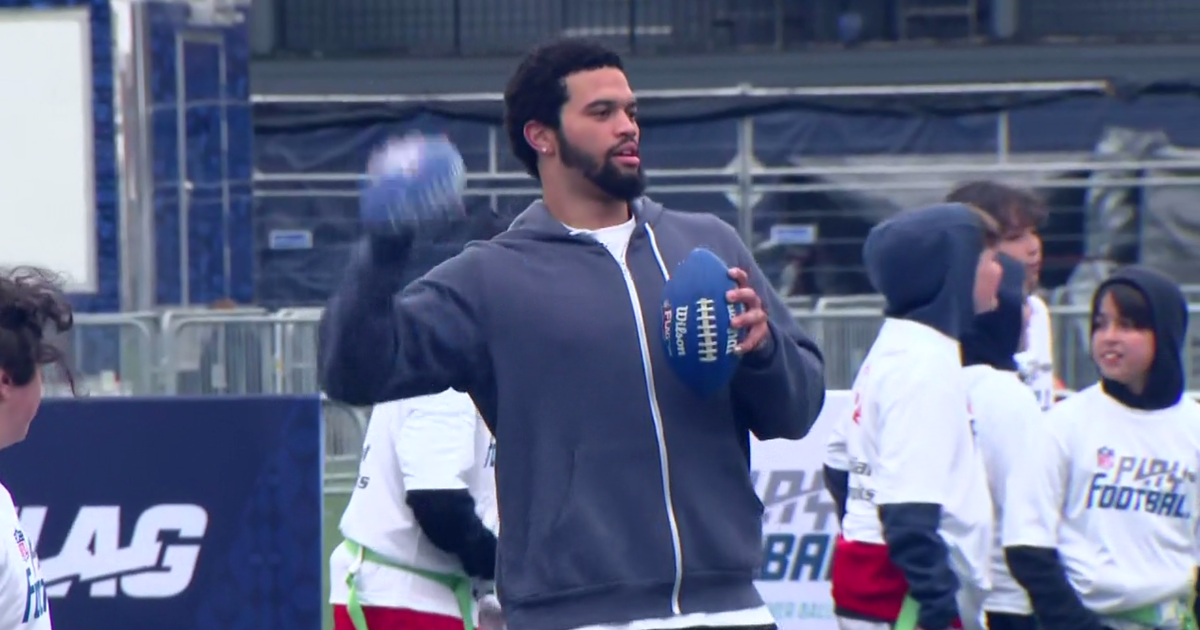DiCaro: U.S. Women's Hockey Team Is Fighting For Your Daughter
By Julie DiCaro--
(CBS) Imagine you land your dream job, the job you've wanted more than anything else since you were a child. Imagine you worked harder than almost anyone else to get the job. You have to be at the top of your game every time you head to work or you risk losing your job to someone else. Imagine you pour everything you have into your job, 24 hours a day, seven days a week.
Only your job doesn't pay much. Or at all, really. You get $6,000 every four years for your job, spread out over a six-month period. But you love your job so much, you do it anyway. So you get another job and maybe a third job to make ends meet, to earn a living wage. The only catch is that your first job, the one you love, also requires you to ask for eight to 10 weeks off each year. And you spend three to five hours a day on your first job, so you have to find second and third jobs that are willing to accommodate that time.
Once every four years, you have to ask for six months off your other jobs or quit them altogether. But that's OK, you do it. You work as hard as you can at the first job and hope things will change. You hope things will be better for the next generation. You do it for the love of the job.
If it sounds like a tough way to make a living, you're right. This is the situation the US women's national hockey team finds itself in just days before the start of the 2017 Women's World Hockey Championships in Plymouth Michigan. Though the team started negotiating 14 months ago with USA Hockey for a living wage, treatment more on par with the men's national team and more funding to develop the game at the youth level, the team finds itself on the brink of a boycott of the World Championships.
"Typically, you are training five to six days a week for one to three hours depending on the day," U.S. alternate captain Monique Lamoureux-Morando said. "Then we skate, so you are at the rink for an additional two hours. I live in close proximity to the rink and where I train, so I'm lucky in that aspect compared to teammates who have to commute. Then you have the whole nutrition, recovery, and mental aspect that goes into being an elite athlete. It's literally a full-time job. If I wasn't working on top of training, I would devote more time on the ice and in the gym, but I don't have the time. I have to prioritize every single day for what I want to accomplish on the ice and in the gym."
The failure of USA Hockey to pay the nation's top women's players a living wage is only one of the reasons the U.S. women's team is threatening to boycott the the World Championships. A report that the women are asking for $68,000 per year are false, Lamoureux-Morando said.
"I wish we were asking for that much," she said in an interview with Julie DiCaro & Brian Hedger on 670 The Score on Saturday. "We are not asking for NHL salaries or hundreds of thousands of dollars. We are simply asking for a livable wage."
Some women who play for the national team end up moving back in with their parents, stay on their parents' health care as long as possible or stay on the family cell plan to save extra money each month, Lamoureux-Morando said. Compare the situation of the U.S. women's hockey players to that of the U.S. women's soccer team, whose members are paid a base salary of $72,000 each year, before bonuses. The women's soccer team also plays a 20-game exhibition tour around the country each year and has been heavily promoted by U.S. Soccer, a move that has been credited for an influx of young girls into the game.
But it's more than just the women's personal financial situations that have motivated them to threaten to boycott. A key demand in negotiations has been the players calling for USA Hockey to put more money into developing training programs for girls at the youth level.
"USA Hockey has the national development program for 17- and 18-year-old boys that they spend 3.5 million dollars on," Lamoureux-Morando said. "It would be great if something similar was created for the women. I fully understand that that does not happen overnight. But how are girls supposed to dream of what they cannot see?"
In an effort to field a team for the World Championships, USA Hockey has begun contacting lower-level replacement players to gauge their interest in taking the place of the boycotting women's team. The women's team, though, had begun forming a coalition before it decided to boycott.
"We have been in contact with every single NCAA Division-I coach," Lamoureux-Morando said. "We have emailed and or talked to every single one of them. We also talked to every National Women's Hockey League player and players from the Minnesota Whitecaps. We did this after we had already had conversations with every single person in our player pool, which is about 90 players. We had those players all on board before we made our stand last Wednesday. This past Friday, we caught wind that USA Hockey was reaching out to Division-III and high school-aged players. As soon as we heard that, we emailed every single organization or coach that had a team going to Nationals next week (which are also in Michigan). We also emailed every single Division-III coach and talked to most of them on the phone. From what we know, we have heard of possibly one to three players that have said 'yes.'"
Even if USA Hockey can convince enough women to play in the World Championships, it's doubtful the team would make a decent showing. On Sunday, USA Hockey's Jim Johansson scouted an exhibition game between players from Division-III Adrian College and Switzerland. The Swiss won the game 11-1.
In addition to professional, college and high school students who have already declared they won't play for USA Hockey in the World Championships, the women have gotten support in some unlikely places. Both the MLB and NHL players associations have pledged their support, and the U.S. men's national team has also threatened to boycott its World Championships in solidarity with the women's team.
Whether the women will be able to salvage the World Championships remains to be seen. A meeting Monday with USA Hockey's board of directors, which reportedly scrapped a hard-fought deal reached between the two sides last week, should settle the matter of the boycott once and for all. But for the U.S. women's national hockey team, the World Championships are small price to pay for setting up the next generation for success.
"We believe if you invest in your national programs and market them properly, like U.S. Soccer does, it will create interest at the grass roots levels,"Lamoureux-Morando said. "That means more girls will sign up and pay more membership fees to USA Hockey, which puts money back in their pockets. It's important for girls to have female role models. If you make your team more visible to the public, we believe USA Hockey benefits, women's hockey benefits and the hockey world benefits."
Follow Julie DiCaro on Twitter and like her Facebook page.



